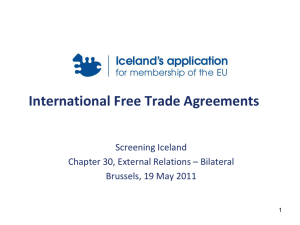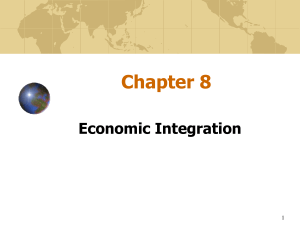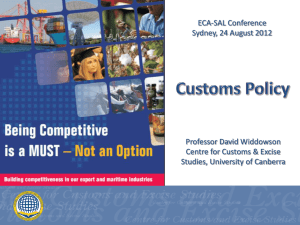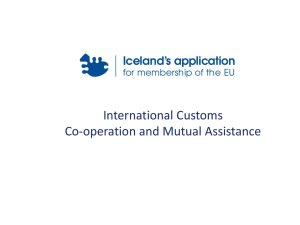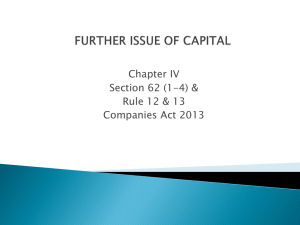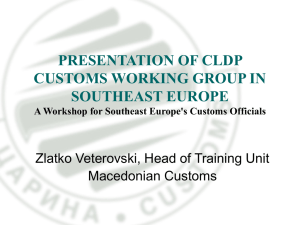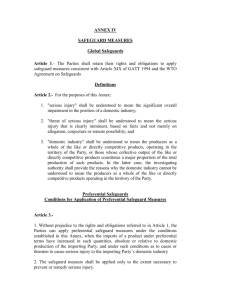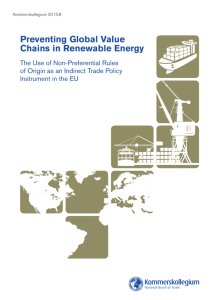Rules of origin
advertisement
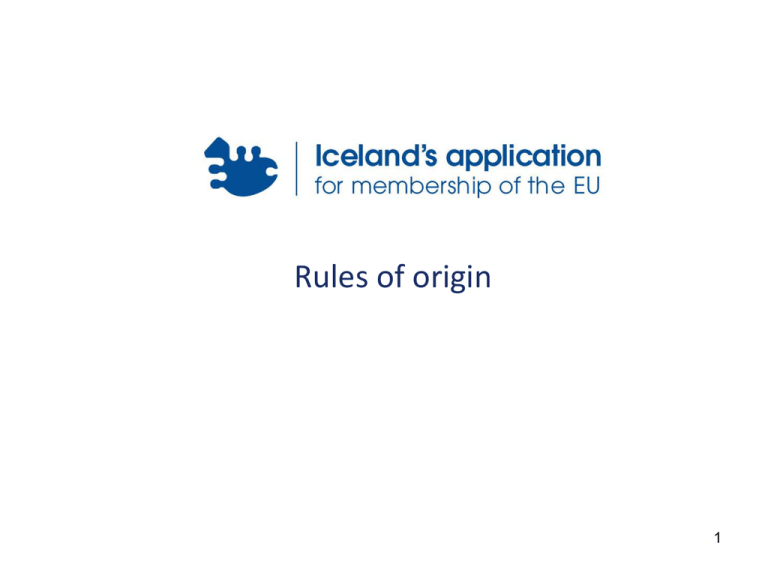
Rules of origin 1 Overview • • • • • • • Non-preferential rules of origin Preferential rules of origin Binding origin information Issuing of EUR 1 certificates Requests for validation Approved exporters Gap Analysis 2 Legal Framework • The Customs Act No 88/2005 • Articles 7 and 145 • Regulation No 119/2002 on a General System of Preferences – Tariff Preferences in regard to the Importation of Products Originating in the World’s Poorest Developing Countries 3 Non-Preferential Rules of Origin • As a member state of EFTA and as a signatory to the EEA-agreement, Iceland is subject to the rules therein concerning non-preferential origin • There are no rules on a national level on how to determine non-preferential origin • Thus far, there has not been reason to apply rules of non-preferential origin in Iceland 4 Preferential Rules of Origin • Art. 145 of the Customs Act • The Minister is authorized to issue general rules of origin applicable to importation and exportation of goods • General rules of origin have thus far not been issued in Iceland 5 Preferential Rules of Origin • The preferential rules of origin are based on FTAs Iceland has concluded and the protocols defining the rules and concepts of originating products, which are part of those agreements • The preferential rules of origin therefore depend on the FTA that is applied in each case 6 Preferential Rules of Origin • Art. 7, paragraph 1, of the Customs Act • Duties shall be reduced, waived or refunded ... in accordance with provisions of free trade agreements and international agreements to which Iceland is a party, from the time the agreement in question has entered into force for Iceland 7 Preferential Rules of Origin • Art. 7, paragraph 1, of the Customs Act • Duties on goods originating in the least developed countries of the world as defined by the UNCTAD/Committee on Enterprise, Business Facilitation and Development shall be waived in conformity to waiving of duties on goods originating in the European Economic Area according to the Agreement on the European Economic Area 8 Preferential Rules of Origin • Regulation No 119/2002 – GSP • Tariff preferences granted to 50 countries • The regulation has not been updated according to the UN list of LDCs • Slight differences between the list of countries in the regulation and the UN list of LDCs. • Rules of origin in Annex 4 9 Preferential Rules of Origin • The EEA Agreement (1994): • Unites members of the EU and the three EFTA EEA states, Iceland, Norway and Liechtenstein into one single market • Rules of origin in protocol 4 10 Preferential Rules of Origin • FTAs that EFTA has concluded with countries outside of the EU: • Canada, Chile, Croatia, Egypt, Israel, Jordan, Republic of Korea, Lebanon, Macedonia, Mexico, Morocco, Palestinian Authority, Singapore, Southern African Customs Union (SACU), Tunisia and Turkey 11 Preferential Rules of Origin • Bilateral FTAs • European Economic Community (1972) • Greenland (1985) • Faroe Islands (2006) 12 Preferential Rules of Origin • The basic rules applied for goods in order to obtain Icelandic origin are: • wholly obtained products • sufficiently worked or processed products • cumulation of origin 13 Binding Origin Information • Art. 145 of the Customs Act • The Director of Customs provides importers, exporters and parties interested with binding opinion on the origin of goods. The opinion shall be provided as soon as possible and not later than 60 days after the request has been submitted • Implementing rules on binding opinions on the origin of goods have not been issued so far 14 Issuing of EUR 1 Certificates • EUR 1 certificates are issued in accordance with protocol 4 to the EEA agreement • Exporter submits EUR 1 documents and requests confirmation by the Customs Authorities • Examination of all information and documentation needed to prove the products’ status of origin has been submitted 15 Issuing of EUR 1 Certificates • • If anything is missing the exporter is notified and requested to make amendments If the product is not solely of Icelandic origin, the declaration on the back of the EUR 1 declaration form is compared with the rules of origin in Protocol 4 or the list of production progress in those cases where the materials used for the product did not have origin status according to the rules of origin 16 Issuing of EUR 1 Certificates • • The document is only to be issued if the production, according to the declaration, fulfills the conditions of Protocol 4 and there are no indications to it not being correct If there are doubts, further documentation, e.g. proofs of origin for the materials used, is requested or the product and the production methods evaluated 17 Requests for Validation • • Requests for validation of proofs of origin are handled by requesting the production documentation from the exporter involved The import of materials and the distribution of materials in the country are also subject to regular surveillance 18 Requests for Validation • • • In 2010 The Directorate of Customs sent 1 request for validation and received 25 requests In 2009 The Directorate sent 8 requests for validation and received 31 requests In 2008 The Directorate sent 2 requests for validation and received 30 requests 19 Approved Exporters • • 1. january 2011 - Previous authorizations of approved exporters were revoked and exporters made to reapply for authorization Since then, 112 exporters have been authorized as approved exporters and 7 applications are pending 20 Approved Exporters • • Authorization is valid for 5 years. Conditions for authorization: • Periodic export, at least 24 shipments per year in average • Knowledge of the rules of origin found in freetrade agreements 21 Gap Analysis • On accession the EEA agreement, agreements that EFTA has concluded with third countries and bilateral agreements Iceland has concluded would be replaced by the preferential agreements of the EU 22 Thank you for your attention! 23
